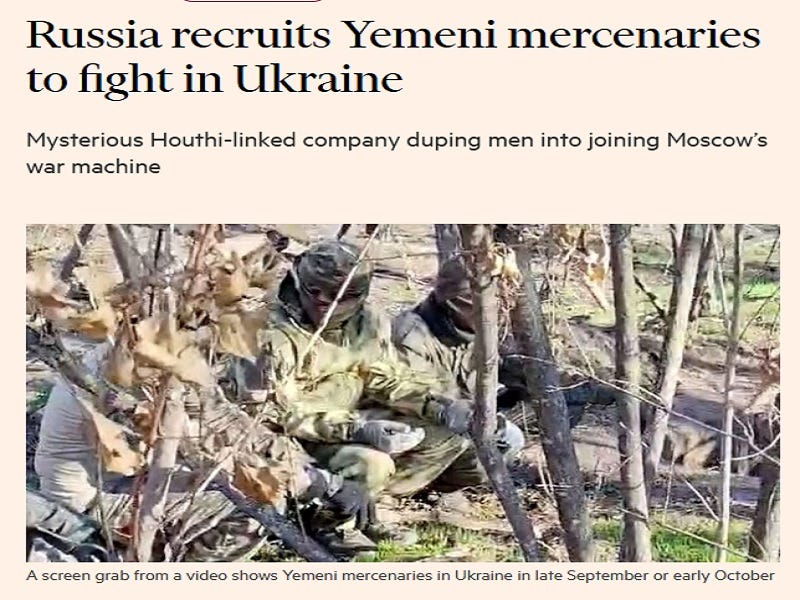It’s dishonest to conflate alleged victims of human trafficking rings with the Russian state’s recruitment of foreign fighters.
The Financial Times (FT) published a report over the weekend about how “Russia recruits Yemeni mercenaries to fight in Ukraine”, but the headline is very misleading. Upon reading the article, it’s discovered that what might actually be happening is that a shady company owned by a top Houthi official is allegedly duping some of the group’s most desperate members into playing these roles. They’re also apparently aided by what appear to be corrupt elements inside of Russia who facilitate this.
This isn’t the first time that a group of foreigners were supposedly victims of human trafficking rings operating within their country and Russia. Cubans, Nepalis, and Indians were all caught up in these plots in the past according to reports at the time that were analyzed in each of the three preceding hyperlinked articles. Such arrangements aren’t sanctioned by the Russian state due to the coercive and involuntary nature that characterize many of these “recruitments”, which are against its interests.
Regrettably, however, these rings continue to operate as suggested by the latest report that they’re now targeting desperate Yemenis from the Houthi-controlled part of the country. This isn’t equivalent to the state’s recruitment of foreign fighters though it’s dishonestly conflated as such by the FT in order to lend false credence to prior unsubstantiated reports about secret Russian-Houthi military ties. Readers can learn more about them here, which also enumerates five associated analyses from January to August.
The point being made by bringing this all up is that Russia doesn’t have some secret deal with the Houthis to recruit fighters against Ukraine. Corrupt elements within both are responsible for the reportedly coercive and involuntary nature of these alleged “recruitments”, the details of which could actually harm their bilateral ties if there’s any truth to them instead of serving as supposed proof of their strength. After all, Houthis are being duped into fighting against their will, if the report is to be believed.
Regardless of its veracity, whether in whole or in part, Russia would do well to conduct a comprehensive investigation in response to this latest scandal which follows related Cuban, Nepali, and Indian ones over the past year. It’s not always the case that “where there’s smoke, there’s fire”, but it’s still better to be safe than sorry and risk the possibility that corrupt elements continue operating to the detriment of Russia’s international reputation, especially in the eyes of friendly countries and groups like the Houthis.
There’s also of course the possibility that no foul play took place and that what might have instead happened is that desperate Yemenis who volunteered to join the Russian Armed Forces were simply spooked by what they experienced and now want to pretend like they were duped in order to save face. That’s not to suggest that Yemenis are cowards, not at all, but just that such an explanation can’t be discounted at this time pending the conclusion of the comprehensive investigation that was proposed.
Considering the frequency of such reports, more might be forthcoming, which could also once again involve other friendly countries and groups. They’re either fake news, due to some corrupt elements operating on both sides, and/or just face-saving excuses for cowardly foreign volunteers. Whatever the truth may be, nobody should assume that the Russian state is involved in such scandals since it has no interest in coercing or duping anyone into involuntarily fighting in its support against Ukraine.





to blacken Russia and Putin any lies told
A couple of months ago, in a conversation with the Ambassador of an “insert African Country here”. I was informed of a similar happening. Citizens from said country were been enticed with lucrative work abroad offers, and upon entry into Russia, were informed that they would be trained to work as security men to serve in the various train stations etc. They were then subsequently made to sign a contract without the services of a competent interpreter or legal person, only to later discover that they have been recruited into the Army.
Perhaps as you said, they may be some shadowy independent organisation working to do this. Perhaps not! What matters is that Russian authorities get behind it and resolve this
I